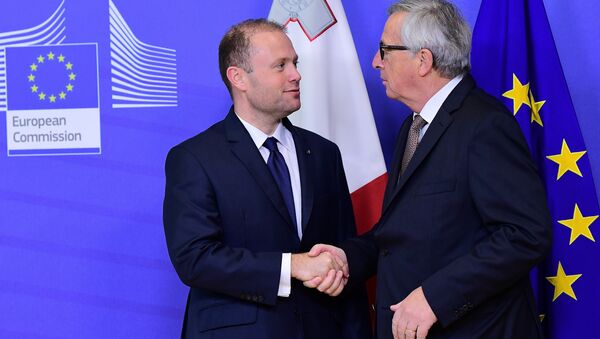The dual issues of tax transparency and offshore tax havens surged in prominence over 2016, due to a cavalcade of scandals such as LuxLeaks, SwissLeaks and the Panama Papers.
As a result, confronting and rectifying these issues is said to top the EU's agenda in 2017, with EU finance ministers scheduled to finalize legal proposals requiring large multinationals operating in Europe to disclose profits earned and taxes paid "country by country."
Welcome to @EU2017MT who takes over the rotating presidency today at @eucocouncil. Find out more about it: https://t.co/ivHQgGR2O1 #EU2017MT pic.twitter.com/UDSNNULe8i
— EU Council (@EUCouncil) January 1, 2017
Despite this push, group of Green MEPs have questioned whether this can be achieved with Malta at the Council's helm, and if the Maltese Presidency might actively hamper such efforts.
In a report published January 10, titled Is Malta A Tax Haven?, the group notes Malta helped multinationals avoid paying €14 billion (US$12.14bn) in taxes between 2012 and 2015 that would have gone to other countries, and would be deemed a tax haven under the EU's own principles.
Alex Cobham, chief executive of the Tax Justice Network (TJN), told Sputnik he agreed that there were "real risks and concerns" about Malta's EU Council Presidency.
"Malta's Presidency, coupled with Jean-Claude Juncker's Presidency of the EU Commission, means key levers of EU power are in the effective hands of two financial secrecy jurisdictions. A good indicator of whether Malta has influenced EU thinking and policy around tax havens will be how the EU's tax haven blacklist evolves.
"The first instalment of the list in 2015 was limited to non-EU jurisdictions, which is obviously ridiculous given how many effective tax havens operate within the EU. If Malta defends that position, they are obvious and unashamed opponents of serious transparency," Cobham told Sputnik.
Malta has already vouched it will be an honest and neutral broker @presidentMT meeting @JunckerEU ahead of #EU2017MT pic.twitter.com/6rnsXD6C3f
— EU2017MT (@EU2017MT) January 11, 2017
Every two years, TJN publishes a Financial Secrecy Index, ranking countries according to their level of opacity in respect of tax and financial dealings. TJN's 2015 instalment ranked Malta 27th out of 70 countries for financial secrecy — and Juncker's home country of Luxembourg sixth.
US in third, just behind Hong Kong, in @TaxJusticeNet's Financial Secrecy Index: https://t.co/2s2fIquveK pic.twitter.com/Nvj2pUAZ1q
— Casey Michel (@cjcmichel) November 7, 2016
There were several key findings in the Greens' report, including that while companies are theoretically subject to a flat 35 percent income tax in Malta, the highest in the EU, in reality companies can easily reduce their effective tax rate to a mere 5 percent, and company shareholders can receive a tax refund of up to six-sevenths of any tax paid.
Furthermore, its lax intellectual property income tax regime is argued to directly promote aggressive tax planning structures, and the country almost entirely lacks national anti-tax avoidance measures.
New study proofs: #Malta is a tax haven! Big companies pay 5% taxes. Maltese EU presidency has to make a move! https://t.co/VJiH0dozii pic.twitter.com/QSzVLvMTLF
— Sven Giegold (@sven_giegold) January 11, 2017
In 2016, the EU executive deemed Malta's tax regime "too generous," and found the country offered a total of 14 "aggressive tax planning indicators," putting it ahead of even Luxembourg in a league table.
The group also raises doubts about Malta's ability to support and push through EU anti-money laundering and tax reforms, in light of the Panama Papers revealing Maltese Minister without Portfolio Konrad Mizzi and Chief of Staff Keith Schembri have offshore interests and were connected to Mossack Fonseca. Former Nationalist Party Minister Ninu Zammit's name was also among the list of Maltese names found in the documents.
@KarmenuVella @JHahnEU @KonradMizzi at visit of @MaltaGov cabinet to @eu_comission @JunckerEU pic.twitter.com/NdAslegme3
— Chris Cardona (@ChrisCardonaMP) November 16, 2016
Finally, the report found Malta had rarely sided with European countries that support tax reform since its ascension to EU membership in 2004. MEPs were particularly concerned that Malta's Presidential priorities not once mention the word "tax."
We are very optimistic on the level of collaboration between our Presidency and the European Commission — @JosephMuscat_JM pic.twitter.com/Z3erg5CCfy
— EU2017MT (@EU2017MT) January 11, 2017
However, Cobham is not entirely pessimistic about the prospects for tax transparency in the EU under Malta's Presidency. He added that there has been a growing tax transparency mood worldwide in recent years, aggravated significantly by the Panama Papers, and the degree to which Malta could resist that temper is questionable.
Moreover, he believes Brexit could have a positive effect on tax transparency in the EU.
"Given the UK's own virtual tax haven status, and its premier position in the offshore haven sphere — its overseas territories Bermuda, the British Virgin Islands, the Cayman Islands, Guernsey, the Isle of Man and Jersey all score highly on our financial secrecy index — the country has been a key voice lobbying for maintaining tax haven opaqueness in recent years. Now, the UK won't be able to influence EU discussions on financial secrecy, which can only be a positive for tax transparency in the EU. Whether the UK will become more secretive about offshore financial affairs remains to be seen," Cobham said.
Malta's Presidency ends June 30.


